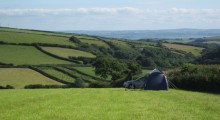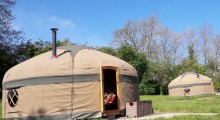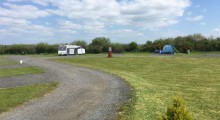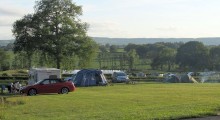Camping etiquette: The unwritten rules
 Going camping is one of the best activities for stress relief there is, that much has been proven. Countless studies have shown that the fresh air, exercise and the complete removal from day-to-day life can relax and rejuvenate even the most worn-down individuals.
Going camping is one of the best activities for stress relief there is, that much has been proven. Countless studies have shown that the fresh air, exercise and the complete removal from day-to-day life can relax and rejuvenate even the most worn-down individuals.
That said, there are one or two niggles that can turn even your most carefree fellow campers into a seething ball of rage – or at least get them mildly irked. So to avoid this fate, here are a few rules to which every camper would be wise to adhere; a Highway Code for camping, if you will.
Be mindful of your parameters
Campers are a friendly bunch and will often invite their neighbours round for a tea, coffee or something decidedly stronger. However, it’s best to give your neighbours a little bit of space before getting to know them properly.
Make sure you know the parameters of your pitch, so you can keep your car and tent within them. Pulling up in a people carrier that could double up as a stretched limo, then proceeding to unfurl a tent big enough to blanket most of Hertfordshire is all well and good, but only if you have sufficient space to do so. The best option will be to first work out where your pitch ends and your neighbour’s begins, then set up accordingly. Keep guy ropes in mind here as well, otherwise it may appear as though you’ve set up a Krypton Factor-style challenge for neighbours to negotiate.
Finally, it’s also worth looking at where a neighbour’s tent is facing. If they’ve angled it to make the most of sunsets over the nearby hillsides, try not to park right in their way.
Treat the campsite as you would your own home
Although everyone will have a different definition of ‘clean and tidy’, it’s worth having as much respect for the campsite as you do your own home. This means keeping the place clear of rubbish bags, not dropping litter, limiting noise and rinsing out the sinks once you’ve used them. This needn’t mean that a camping trip must be quieter and more subdued than a sponsored silence at a temperance meeting, of course, just that campsites are much more enjoyable when everyone treats them with respect.
On the other hand, there are one or two ways in which it might be wise to not bring home habits to the site. If you’re partial to 40-minute showers, for example, it’s probably best to not do this on-site. Not only would you need a reserve of 50 pence pieces to rival a city bank (if the showers are paid-for, that is), you could end up using all the hot water – leaving none for fellow campers. Plus, that walk of shame back to your tent past the queue of people that formed while you were relaxing in the shower certainly won’t be the most enjoyable of experiences.
Be sociable
As noted above, campers are a sociable bunch, happy enough to while away minutes or hours chatting to their neighbours. Proof enough comes in the address books of seasoned campers, which are full-to-bursting with such entries as ‘John and Jean, Blackpool, 1993’ so that Christmas cards can still be sent across the miles – years or even decades since that one fabled holiday.
Likewise, campsite clubhouses are chock full of people sharing their children’s names, day jobs and general anecdotes every night of the week. Even many smaller sites which don’t have pubs or bars on site will often organise social evenings for everyone to get together and have a good natter.
The end result is that campers will often expect others to share in their socialising. Whilst it’s unlikely to go quite so far as having your fellow campers pop round at 6am to see how you slept, expect a trip to the waste water disposal to be met with a few convivial “hello” and “how are you” greetings.
Think of it this way. If you’re having trouble setting up a tent for the first time, or getting your gas stove to work, a sociable, seasoned camper popping over to offer a hand could be exactly what you need.
Respect the environment
The ways in which a camper should protect the environment is pretty much enshrined in the Countryside Code. In a nutshell it is “respect, protect, enjoy”: respect other people, protect the natural environment and enjoy the outdoors.
When camping, though, there are a few more specific considerations to always bear in mind.
First, be aware of local animals and treat them with caution. Many sites are near farms or rolling countryside, meaning there may be cows, horses, sheep or other livestock occupying nearby fields. Avoid them where possible, but if you need to pass through the field do so slowly and steadily, without making any sudden movements. If the animals approach you, however, it’s likely they are comfortable in your presence so therefore pose less of a threat.
Similar caution needs to be exercised when feeding animals. Many farmers would prefer you didn’t, as it could mean they end up getting the wrong food, or too much. Similarly, it could encourage them to go in search of more treats – meaning your fellow campers suddenly have a flock of sheep outside their tents, chewing their guy ropes and trying to make off with their cool bags.
It’s not only animals you need to consider, but the wider environment at large. Campers are always advised against taking wood from standing trees for their fires, whilst Chinese lanterns have been banned by countless sites across Britain for the danger they pose.
The above rules are, of course, just guidelines that can vary from site to site. Keeping them in mind, though, should ensure your camping trips are successful ones, both for you and those nearby.
 Camping Le Clos Bouyssac
Camping Le Clos Bouyssac Loch Tay Highland Lodges
Loch Tay Highland Lodges Sauchope Links Park
Sauchope Links Park Linnhe Lochside Holidays
Linnhe Lochside Holidays Braidhaugh Holiday Park
Braidhaugh Holiday Park Badrallach Campsite, Bothy & Holiday Cottage
Badrallach Campsite, Bothy & Holiday Cottage West Highland Way Campsite and Hotel Accommodation
West Highland Way Campsite and Hotel Accommodation Ruberslaw Wild Woods Camping
Ruberslaw Wild Woods Camping Mountview Lochinver
Mountview Lochinver Eriskay B&B and Glamping
Eriskay B&B and Glamping Harvest Moon Holidays
Harvest Moon Holidays Goldpark Leisure
Goldpark Leisure Hill Farm Caravan and Camping Park
Hill Farm Caravan and Camping Park Tanner Farm Park
Tanner Farm Park Plough Leisure Caravan Park
Plough Leisure Caravan Park Harry's Field
Harry's Field Hill Cottage Farm Camping & Caravan Park
Hill Cottage Farm Camping & Caravan Park Forest Edge Touring Park (Shorefield)
Forest Edge Touring Park (Shorefield) Old Barn Touring Park
Old Barn Touring Park Ninham Country Holidays
Ninham Country Holidays Grange Farm
Grange Farm Experience Sussex at Wimbles Farm
Experience Sussex at Wimbles Farm Park Farm Caravan and Camping
Park Farm Caravan and Camping Lepe Meadows Campsite
Lepe Meadows Campsite The Garlic Farm Yurts
The Garlic Farm Yurts Lepe Beach Campsite
Lepe Beach Campsite East Crinnis Holiday Park
East Crinnis Holiday Park Hendra Holiday Park
Hendra Holiday Park Field725 Camping & Glamping
Field725 Camping & Glamping Graston Copse Holiday Park
Graston Copse Holiday Park Highlands End Holiday Park
Highlands End Holiday Park Woodovis Park
Woodovis Park Cheglinch Camping
Cheglinch Camping Beverley Holidays
Beverley Holidays Foxhangers Canalside Holidays
Foxhangers Canalside Holidays Chy Carne Holiday Park
Chy Carne Holiday Park Trevornick Holiday Park
Trevornick Holiday Park East Thorne
East Thorne The Laurels Holiday Park
The Laurels Holiday Park Tregarton Park
Tregarton Park Campden Yurts
Campden Yurts Looe Country Park Caravan & Campsite
Looe Country Park Caravan & Campsite Tencreek Holiday Park
Tencreek Holiday Park Forest Glade Holiday Park
Forest Glade Holiday Park Cofton Country Holidays
Cofton Country Holidays Langstone Manor Caravan & Camping Park
Langstone Manor Caravan & Camping Park Hele Valley Holiday Park
Hele Valley Holiday Park Stowford Farm Meadows
Stowford Farm Meadows Golden Cap Holiday Park
Golden Cap Holiday Park Back of Beyond Touring Park
Back of Beyond Touring Park Merley Court Touring Park (shorefield)
Merley Court Touring Park (shorefield) Portesham Dairy Farm Camp Site
Portesham Dairy Farm Camp Site Sandyholme Holiday Park
Sandyholme Holiday Park Dorset Forest Garden
Dorset Forest Garden Home Farm Holiday Park
Home Farm Holiday Park Old Oaks Touring Park
Old Oaks Touring Park Petruth Paddocks
Petruth Paddocks Prattshayes Campsite & Exmouth Country Lodge
Prattshayes Campsite & Exmouth Country Lodge Quantock Orchard Caravan Park
Quantock Orchard Caravan Park Hole Station Campsite
Hole Station Campsite St Tinney Farm
St Tinney Farm Trewan Hall
Trewan Hall Hobby Farm
Hobby Farm Treglisson Touring Park
Treglisson Touring Park Glastonbury Cottages and Caravanning Certificated Site
Glastonbury Cottages and Caravanning Certificated Site Woodview Campsite
Woodview Campsite Andrewshayes Holiday Park
Andrewshayes Holiday Park Court Farm Campsite
Court Farm Campsite Carvynick Holiday Park
Carvynick Holiday Park Reforge Retreat
Reforge Retreat Galton Campsite
Galton Campsite Fairwood Lakes Holiday Park
Fairwood Lakes Holiday Park Mousehole Camping
Mousehole Camping Deanwood Caravan and Camping
Deanwood Caravan and Camping The Hen's Den at Orchard Organic Farm
The Hen's Den at Orchard Organic Farm Canna Farm Campsite
Canna Farm Campsite West Kellow Yurts
West Kellow Yurts Cheglinch Farm Glamping
Cheglinch Farm Glamping Treloy Touring Park
Treloy Touring Park Nolton Cross Caravan Park
Nolton Cross Caravan Park Cwmdu Campsite
Cwmdu Campsite Waenfechan Glamping and Camping
Waenfechan Glamping and Camping Hafod Hall Camping Club
Hafod Hall Camping Club Red Kite Touring Park
Red Kite Touring Park Tyn Cornel Camping & Caravan Park
Tyn Cornel Camping & Caravan Park Hungerford Farm Touring Caravan Park
Hungerford Farm Touring Caravan Park Daisy Bank Caravan Park
Daisy Bank Caravan Park Plas Farm Caravan Park
Plas Farm Caravan Park Brynawelon Caravan and Camping Park
Brynawelon Caravan and Camping Park Newcourt Farm
Newcourt Farm Ty Mawr Tents and Tourers Certificated Site
Ty Mawr Tents and Tourers Certificated Site Gwaun Vale Touring Park
Gwaun Vale Touring Park Ty Cynan Caravan & Camping
Ty Cynan Caravan & Camping Carn Springs
Carn Springs Treheli Farm
Treheli Farm Nyth Robin
Nyth Robin Living Room Treehouses
Living Room Treehouses Redwood Valley
Redwood Valley The Buttles Caravan Park
The Buttles Caravan Park Allibella Shepherd's Hut
Allibella Shepherd's Hut






































 Going camping is one of the best activities for stress relief there is, that much has been proven. Countless studies have shown that the fresh air, exercise and the complete removal from day-to-day life can relax and rejuvenate even the most worn-down individuals.
Going camping is one of the best activities for stress relief there is, that much has been proven. Countless studies have shown that the fresh air, exercise and the complete removal from day-to-day life can relax and rejuvenate even the most worn-down individuals.
Stay in touch